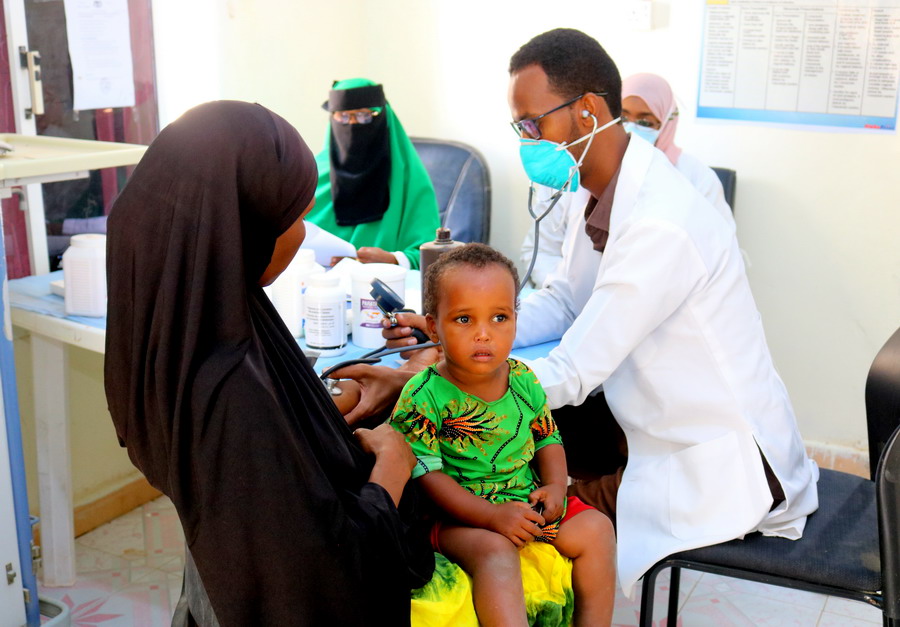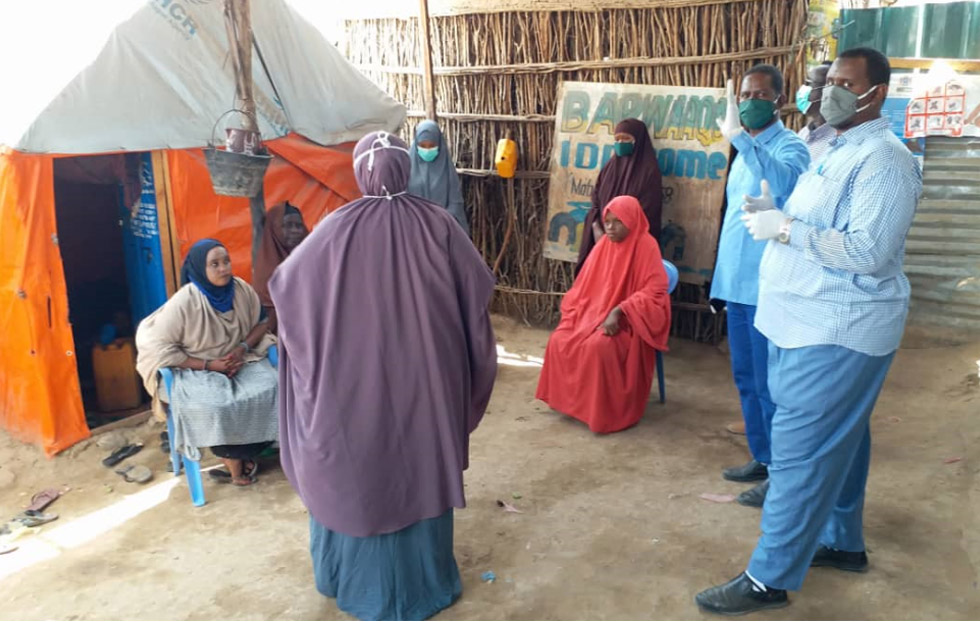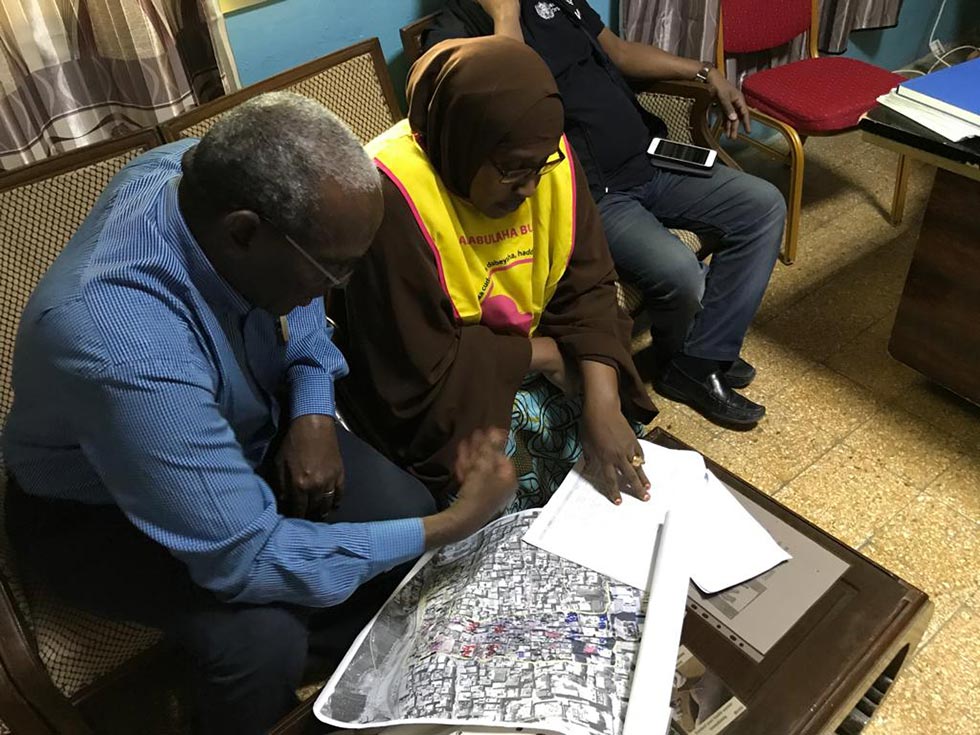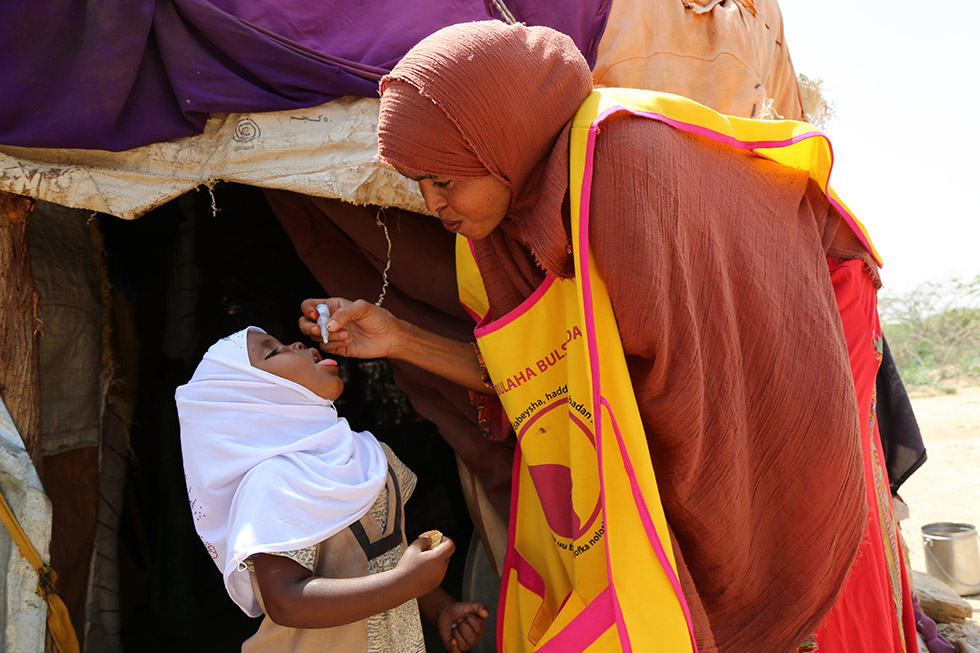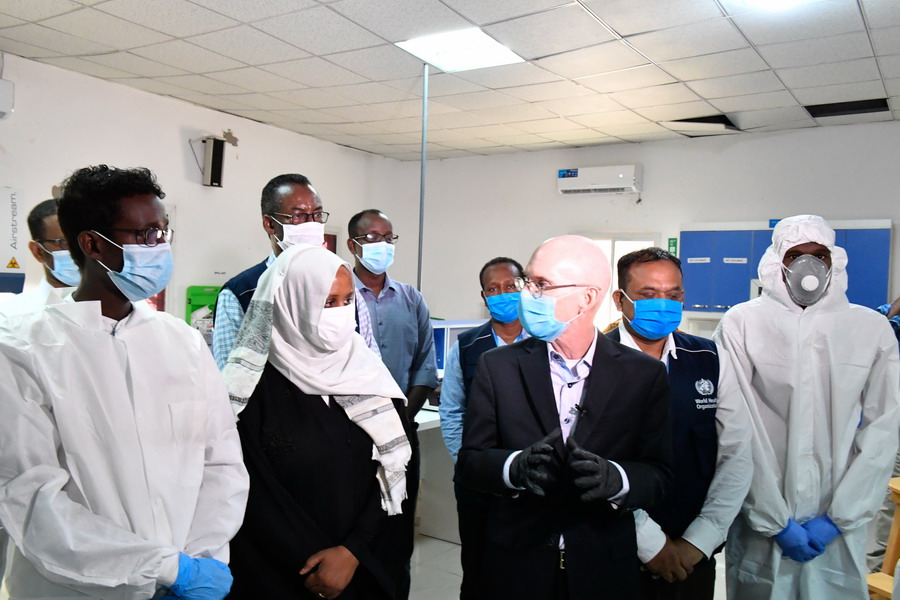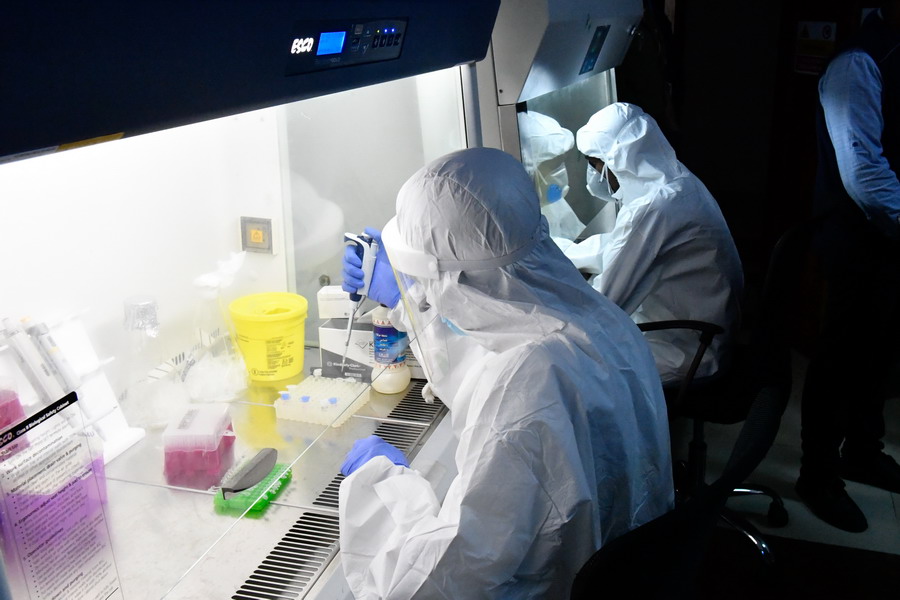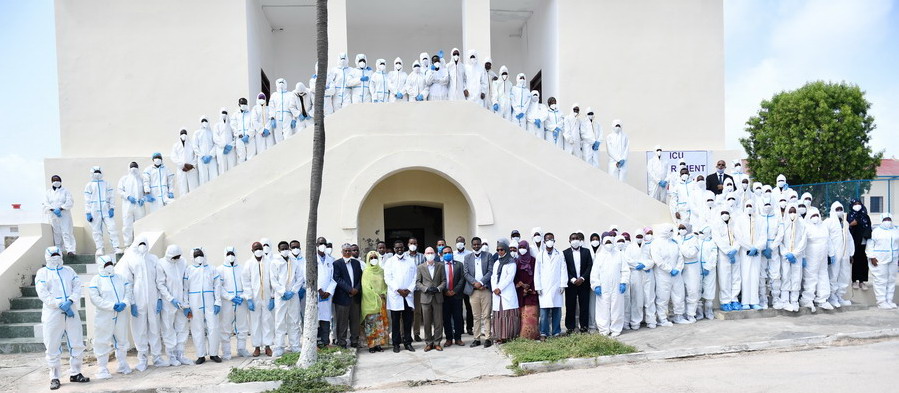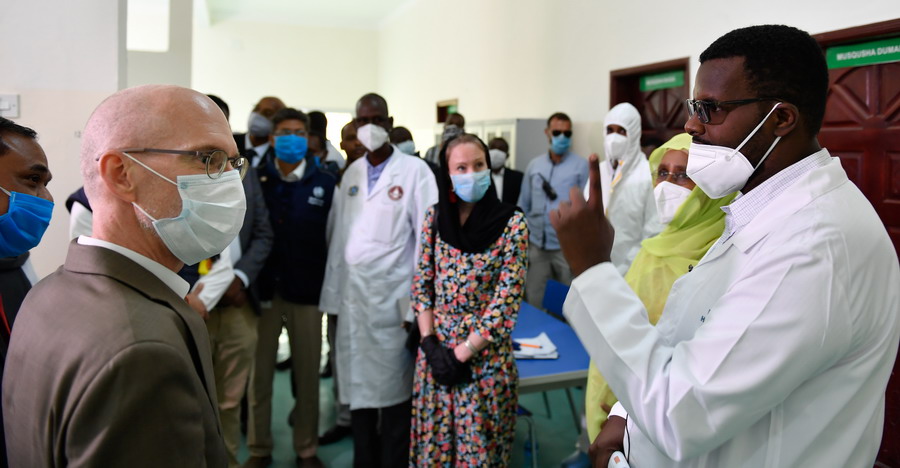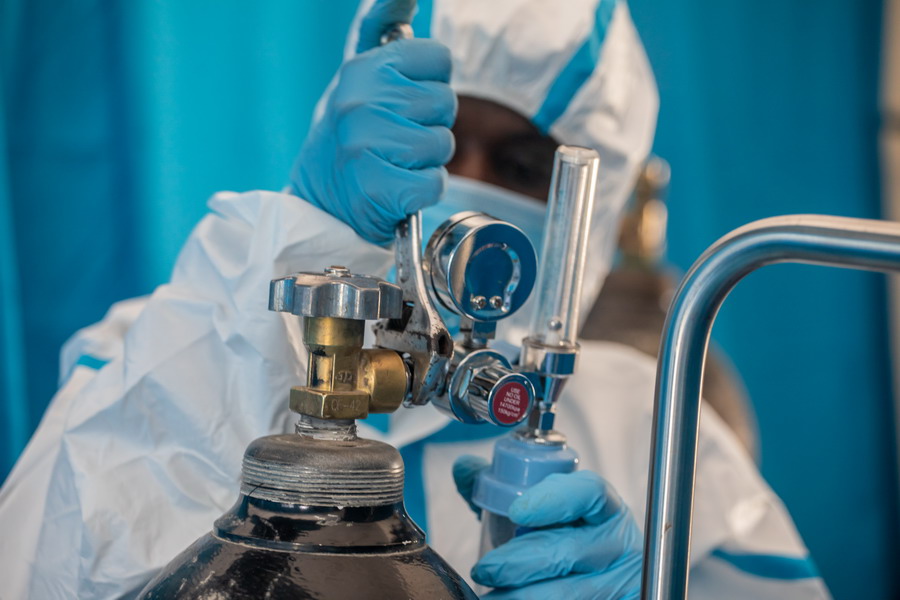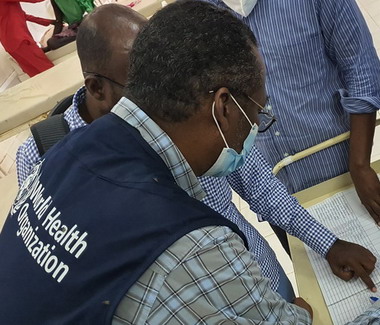
9 August 2020 – The health system of any country needs a surveillance system that can collect information on and detect alerts of epidemic-prone diseases. When a number of cases threatens to turn into an outbreak or epidemic, the surveillance system sounds an alarm that triggers a chain of immediate public health interventions.
Somalia's Early Warning and Alert Network (EWARN) is again proving its value as a real-time early warning disease alert system, as in June 2020, WHO was alerted to a possible measles outbreak in a camp for internally displaced people (IDPs) in Jubaland State and shared this information with the State Ministry of Health. On initial investigation, Somalia's EWARN system reported 11 cases of children with rashes and high-grade fever, typical symptoms of measles, in Kismayo.
Initial phase of outbreak response rolled out following field investigation
As soon as the alert was shared, a team from the WHO Somalia country office, the Ministry of Health in Kismayo, and Health Cluster1 partners took swift action to further verify and investigate the alert, confirm the diagnosis and develop an effective response plan in the event that the alert turned out to be a “true” outbreak.
Between 18 and 25 July 2020, a WHO team was deployed in Kismayo. Together with the Ministry of Health of Jubaland State and a local health partner, field investigations were carried out in the Dalhiiska IDP camp, Warshada Hargaha IDP camp, Farjano, Gulwada, Shaqalah sections, Kismayo General Hospital, and a number of health facilities. The field investigations, led by WHO, identified a total of 400 suspected cases of measles reported from the Jubaland State that met the case definition of measles. Most of the infected children were under-5 years of age from the camps with no history of vaccination against measles. These cases were reported from June to the end of July this year. A total of 7 samples collected from the suspected cases tested positive for measles at the Central Public Health Laboratory in Mogadishu. The tests were conducted using enzyme-linked immunosorbent assay (ELISA).
Once the outbreak was laboratory-confirmed, a response plan was drawn up. As part of this plan, the Kismayo General Hospital, one of the largest health facilities in the state of Jubaland, introduced a new isolation centre offering 20 beds for measles patients. Concurrently, WHO and Health Cluster partners provided support to strengthen case management for each patient, and helped manage the collection and testing of samples from children with symptoms. They retrained health workers on the use of case definitions and to record data using a standardized line-list in order to better understand the size of the outbreak and its geographic extent. Meanwhile, the Ministry of Health in Jubaland convened a meeting with all key partners, including the United Nations Children’s Fund (UNICEF) and WHO, to ensure all outbreak response efforts were coordinated.
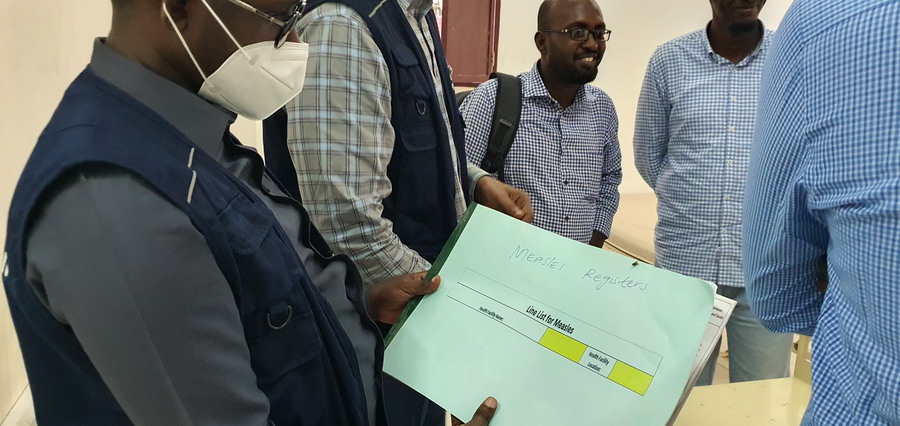
Unvaccinated children due to ‘drop-outs’
Kismayo has been an epicentre for outbreaks of vaccine-preventable diseases, such as measles, in the past for a variety of reasons.
“Host to a large population of internally displaced people from neighbouring, insecure regions where access to health care is limited, we knew there could be many unvaccinated children in Kismayo and other districts. We need to boost immunization among these unvaccinated children from vulnerable and underserved families so that they remain safe,” said Mukhtar Abdi, Expanded Programme on Immunization (EPI) Manager for the Federal Government of Somalia.
Other key challenges faced in the state include a large number of drop-outs, or children who have not received all the vaccinations they require, among host communities and IDPs, coupled with limited routine immunization due to inaccessibility and presumably lack of demand for vaccines.
Additionally, the ongoing COVID-19 pandemic has had an impact on Somalia’s fragile health care system and immunization services. For instance, the vaccination coverage of pentavalent 3, which protects children against diphtheria, Haemophilus influenzae type B, hepatitis B, tetanus and whooping cough, which stood at 77% in 2019, dropped to 56% in June 2020.
Data driving decisions
To address these challenges, health authorities, WHO and partners are using data to guide decisions they make. During outbreaks like this, epidemiological information, on the age of children, for instance, helps decide the target age for children to be vaccinated.
“Together with our partners, we have been collecting data that guides all our decisions. For instance, currently, the district of Guulwade has the largest number of cases, followed by Farjano, Shaqalah and the IDP camps. Our efforts will focus on immunizing children in these areas first,” Idris Hassan Mohamud, Director-General, Ministry of Health, Jubaland State, added.
Greater collaboration needed
“In addition to monitoring the situation closely and boosting children’s immunity in Lower Juba, to stop outbreaks from recurring, we really need to strengthen collaboration among institutions addressing immunization in Lower Juba. I am happy to say there are many agencies working in Lower Juba, but greater collaboration is needed,” said Dr Mamunur Malik, WHO Representative in Somalia. “I would like to welcome any partners who can provide support in this and other interventions to contact us and work toggether to give Somali children a healthy and bright future.”
In the coming days, health authorities will work with WHO and partners to roll out the next phase of a robust response to further curb the spread of the outbreak. Interventions being considered include strengthening collaboration with health agencies working in Lower Juba, offering measles vaccines and vitamin A to children, particularly those living in IDP camps, and mobilizing communities to understand the benefits of vaccination to create demand among caregivers across the state. Efforts will also include strengthening coordination by activating a subnational taskforce to bring all partners on board and maximize limited resources, and organizing outreach services to boost routine immunization for measles and other vaccine-preventable diseases.
EWARN detecting COVID-19 cases
The EWARN has, once again, proven its value in timely detecting an outbreak in a fragile context. WHO is expanding the coverage of EWARN in Somalia during the COVID-19 pandemic era to better track the disease, with the generous support and contributions of donors. The system is able to track and monitor other health threats too, as proven in the timely detection of this measles outbreak in Kismayo.
The recent concern of WHO and other international agencies on the significant drop in routine immunization, against diseases like measles, among vulnerable communities during the pandemic continues to be a cause for concern, as outbreaks of measles and other vaccine-preventable diseases will continue to occur and recur if swift and timely action is not taken to address the steady drop in routine immunization.
Related links
Somalia expands surveillance to better track COVID-19 outbreak
Children missing out on routine vaccinations in Somalia amid COVID-19 fears
1 Somalia’s Health Cluster is a network of national and international organizations working in the health sector across the country, under the leadership of WHO Somalia.
Note: GAVI, the Vaccine Alliance, provides support to the EPI programme in Somalia, run jointly by WHO and Somalia’s health authorities.





